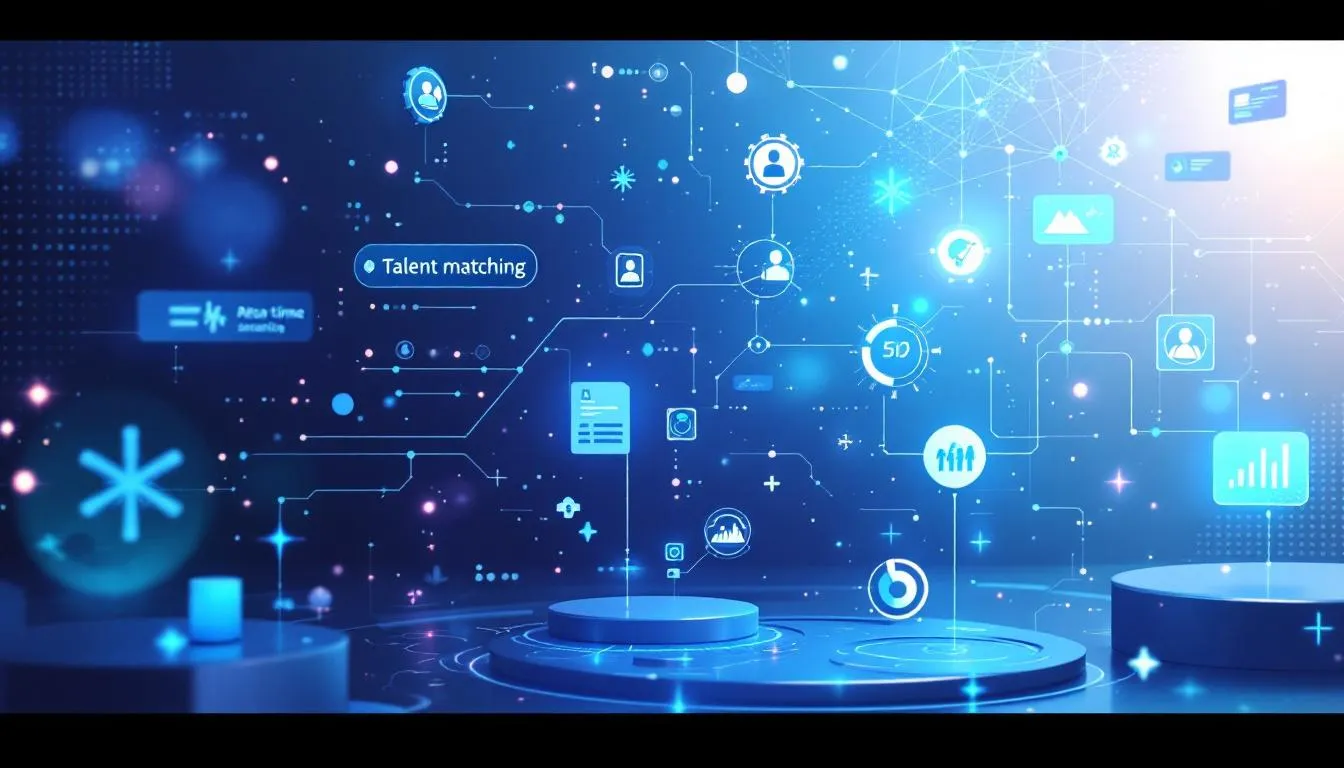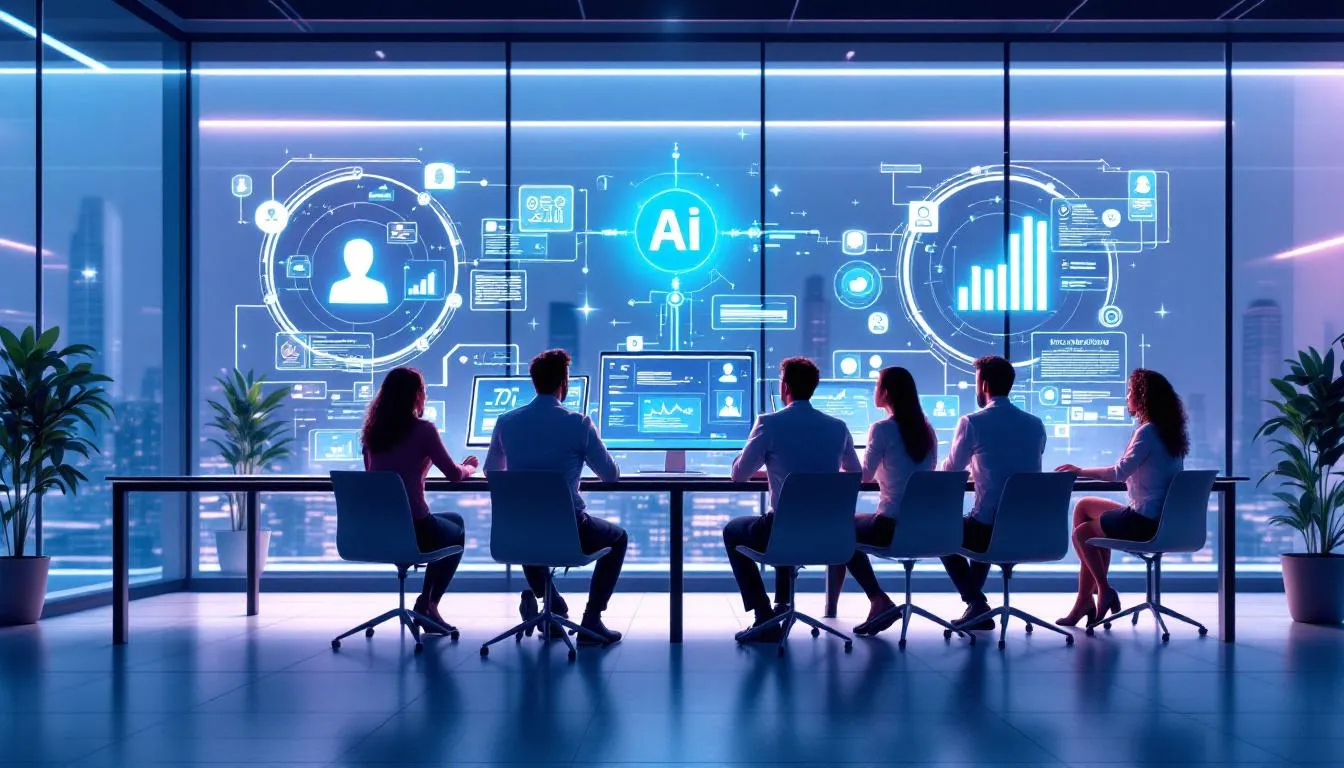AI Recruiting: The Best Practices to Hire Top Talent in 2025
AI recruiting automates and improves the hiring process, making it more efficient and fair. This article will explain how AI is used in recruitment, its major benefits, and what future developments to anticipate.
Key Takeaways
- AI recruiting enhances efficiency by automating manual tasks, allowing HR teams to focus on strategic decision-making.
- Machine learning is fundamental to AI recruiting, as it analyzes candidate data to improve hiring accuracy and reduce bias.
- Implementing AI in recruitment requires addressing challenges such as data quality, bias, and the need for ongoing monitoring of AI tools.
Understanding AI Recruiting

AI recruiting refers to the application of Artificial Intelligence to the recruitment process, revolutionizing how organizations attract, engage, hire, and retain talent.
Traditional hiring processes can be labor-intensive and often bogged down by repetitive tasks, but AI transforms this by automating many of these duties, thus enhancing the efficiency of hiring managers and HR teams.
AI can ask candidates screening questions via one-way video, enhancing the candidate screening process and allowing human recruiters to focus on strategic activities. Organizations can also use ai to streamline their recruitment efforts.
Integrating AI into recruitment significantly improves the lives of recruiters and HR professionals. Automating manual tasks with AI frees up recruiters to focus on high-value activities that need human intuition and decision-making.
Moreover, AI tools provide data-driven insights that help recruiters make better hiring decisions, ensuring a more equitable and efficient recruitment process.
The Role of Machine Learning in AI Recruiting
Machine learning, a subset of artificial intelligence, is at the heart of AI recruiting tools. It enables systems to learn from data and improve performance without explicit programming.
Machine learning algorithms can quickly analyze candidate profiles and performance data to assess job requirements and candidate suitability, thanks to their ability to recognize patterns and make data-based predictions. This capability transforms the recruitment process, making it faster and more accurate.
The effectiveness of machine learning in recruitment largely depends on the quality and volume of data available for training models.
Different types of machine learning, including supervised, unsupervised, and reinforcement learning, cater to various recruitment tasks, from candidate sourcing to performance analysis. This technology not only streamlines the recruiting process but also enhances the ability to make informed decisions, ultimately leading to better talent acquisition outcomes.
Key Benefits of AI Recruiting Tools

AI recruiting tools offer numerous benefits that significantly improve the efficiency and effectiveness of the hiring process:
- Automate repetitive tasks, allowing recruiters to focus on strategic activities and high-value interactions.
- Enhance diversity and inclusion by reducing unconscious bias.
- Improve candidate experience through personalized interactions, utilizing recruiting software, recruitment tools, and ai recruitment tools.
Save Time and Resources
One of the most significant advantages of AI recruiting tools is the reduction in time to hire. Automating repetitive tasks like resume screening and candidate scoring with AI powered tools drastically shortens recruitment cycles and enhances the hiring process.
AI tools can automatically schedule interviews and send job offers, streamlining administrative tasks and allowing recruiters to focus on strategic initiatives.
Additionally, AI reduces recruitment costs by making the entire process more efficient. AI chatbots and calendar integrations further enhance this efficiency by coordinating interviews and providing instant responses to candidate queries, ensuring a seamless experience for both recruiters and candidates.
Improve Diversity and Inclusion
AI recruiting tools play a crucial role in promoting diversity and inclusion within the workplace by:
- Reducing unconscious bias through objective grading of candidates based on skills and experience
- Ensuring fairer assessments
- Avoiding influence from subconscious factors such as personality or ethnicity, unlike human recruiters This leads to more equitable hiring processes.
Furthermore, AI helps create unbiased writing job descriptions, which are essential for attracting a diverse pool of applicants.
Biased wording in job descriptions can deter candidates, particularly women, from applying, thus reducing diversity. AI fosters a more inclusive recruitment process by focusing on candidates’ skills and experience.
Improve Candidate Experience
Improving candidate experience is another significant benefit of AI recruiting tools. AI-powered solutions provide real-time updates to candidates, keeping them informed and engaged throughout the recruitment process. This reduces frustration and enhances the overall candidate experience.
Moreover, AI personalizes candidate interactions by:
- Offering customized job recommendations and dynamic content based on candidate profiles and search history.
- Using AI chatbots to maintain engagement and build loyalty by providing instant responses to candidate queries.
- Guiding candidates through the hiring process.
How AI is Transforming the Hiring Process

AI is revolutionizing the hiring process by supporting strategic workforce planning and transforming talent acquisition. With AI, recruitment becomes faster, smarter, and more efficient, significantly enhancing decision-making capabilities.
AI tools streamline processes such as candidate screening, onboarding, and performance analysis, allowing HR teams to focus on more strategic activities.
Furthermore, AI-driven internal mobility helps identify and promote existing employees for new roles, improving retention and organizational agility. The predictive capabilities of AI enable recruiters to identify high-potential candidates early, transforming recruitment from a reactive to a proactive process.
Automated Resume Screening
Automated resume screening is one of the most impactful applications of AI in recruiting. Key aspects include:
- AI tools categorize job applications by analyzing keywords and matching them with job descriptions.
- This significantly speeds up the screening process.
- Organizations can screen thousands of resumes within a short time frame.
- Traditionally, this process would take weeks for human recruiters.
Additionally, AI enhances the screening process for previous candidates by scanning resumes on file for potential matches, ensuring that no qualified candidate is overlooked. Creating job postings free from gender-biased language with the help of AI attracts a broader range of applicants.
AI Chatbots for Recruitment
AI chatbots are transforming how initial interactions with candidates are managed. They:
- Provide prompt answers to frequently asked questions, ensuring that candidates receive timely information.
- Use natural language processing to facilitate interactions.
- Offer personalized job recommendations to potential hires, utilizing ai agents.
Automated interview bots are also becoming increasingly common, conducting initial candidate assessments by analyzing their responses to interview questions to match candidates. This not only saves time for human recruiters but also enhances candidate engagement and experience.
Predictive Analytics in Hiring
Predictive analytics plays a crucial role in modern recruitment by using historical data on hiring to evaluate candidate success in high volume roles. This technology enables organizations to make data-driven decisions, identifying candidates who are most likely to excel in specific roles.
The significant investments in AI to refine predictive hiring models highlight the growing importance of this technology in talent acquisition. Predictive analytics keeps organizations ahead in the competitive job market by recognizing patterns and trends.
Challenges in Implementing AI Recruiting

While AI offers numerous benefits, implementing it in recruitment comes with its challenges. Organizations often face issues related to data quality, transparency in decision-making, and integration hurdles.
The integrity of the data used to train AI models is crucial, as unclean or unstructured data can severely limit AI’s effectiveness.
Challenges related to AI integration in HR include:
- Lack of transparency in AI decision-making processes, raising concerns about compliance and fairness in hiring.
- Difficulty integrating AI tools due to data silos from various SaaS platforms used in HR functions.
- The necessity of a clear understanding of existing workflows for successful AI integration.
Addressing Bias in AI Systems
One of the most significant challenges in AI recruiting is addressing bias in AI systems. Unchecked biases in training data can lead AI systems to favor certain demographics, impacting selection fairness. Continuous support and training for recruiters are necessary to navigate and mitigate these biases effectively.
Ethical audits of AI systems can help identify and reduce bias in hiring practices, ensuring a fair selection process with human oversight. Using a trusted provider can also help organizations guard against AI replicating biases inherited from human creators.
Ensuring Data Privacy and Security
Ensuring data privacy and security is paramount when implementing AI in recruitment. Organizations must discuss transparently how AI is used and its benefits to build trust and ensure compliance with privacy regulations.
Best Practices for Integrating AI into Your Recruitment Workflow
Successfully integrating AI into your recruitment workflow requires a strategic approach and clear business goals. Establishing these objectives is essential for measuring the ROI of AI tools.
Organizations must also balance automation with human interaction to ensure a fair and engaging candidate experience, which is crucial for effective relationship building.
Choosing the Right AI Tools
Selecting the right AI recruiting tools is crucial for aligning with an organization’s specific needs and enhancing recruitment effectiveness.
When selecting AI solutions, consider the following:
- Integration with existing HR technology to ensure a smooth transition and minimize disruptions.
- The unique hiring challenges faced by the organization.
- The tool’s ability to improve candidate matching.
- The capability to streamline recruitment tasks.
Additionally, robust support and training resources are essential for successful implementation. Organizations should choose AI tools that offer comprehensive support to assist recruiters in navigating the new technology, ensuring a user-friendly experience for both recruiters and candidates.
Continuous Monitoring and Evaluation
Continuous monitoring and evaluation are critical for assessing the effectiveness of AI tools in recruitment.
Regularly analyzing the impact of AI on recruitment processes helps organizations identify areas for improvement and ensure that the tools continue to meet their needs.
This ongoing evaluation supports the refinement of recruitment strategies and the optimization of AI tools.
Future Trends in AI Recruiting

The future of AI recruiting is set to be shaped by significant advancements in generative AI and next-generation recruitment technology.
Generative AI, which creates content, is increasingly being integrated into recruitment processes, automating tasks like candidate screening and scheduling. Investment in generative AI skyrocketed sevenfold in 2023, reflecting its growing importance in enhancing recruitment efficiency.
Next-generation recruitment technology, which saw $17 billion in investments in 2023, is streamlining hiring processes and enhancing candidate experiences for prospective employees and job seekers.
These technologies are expected to further improve job postings and resume screening, helping organizations attract and hire the most qualified candidates and the best talent, including great talent, through effective talent strategies and talent pools, ultimately leading to quality hires and top candidates, with many applicants benefiting from these advancements and their technical skills.
Additionally, these advancements support recruitment efforts and enhance the hiring experience.
Staying updated on AI recruiting trends by attending conferences, subscribing to publications, and engaging with thought leaders will be essential for organizations to remain competitive.
Frequently Asked Questions
1. What is AI recruiting?
AI recruiting is the use of Artificial Intelligence technology in the recruitment process, streamlining tasks and offering data-driven insights to improve efficiency and decision-making.
2. How does AI improve diversity and inclusion in hiring?
AI enhances diversity and inclusion in hiring by minimizing unconscious bias, delivering objective evaluations of candidates, and generating impartial job descriptions that draw a wider range of applicants. This leads to a more equitable hiring process.
3. What are the main benefits of using AI recruiting tools?
Utilizing AI recruiting tools significantly enhances efficiency by automating repetitive tasks, thereby saving time and resources. Furthermore, they improve candidate experience and promote diversity and inclusion through personalized interactions and real-time updates.
4. What challenges do organizations face when implementing AI in recruitment?
Organizations face challenges such as ensuring data quality, addressing bias in AI systems, maintaining transparency in decision-making, and overcoming integration hurdles while safeguarding data privacy and security. These factors can significantly impact the successful implementation of AI in recruitment processes.
5. What future trends should we expect in AI recruiting?
You can expect future trends in AI recruiting to feature increased integration of generative AI and advanced recruitment technologies, significantly improving job postings, resume screening, and overall recruitment efficiency. This evolution will streamline the hiring process and enhance candidate selection.



